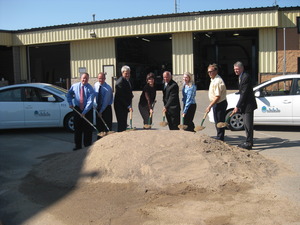 The City of Oakdale has long been a leader for civic sustainability. Metro CERT has been working with Oakdale since the summer of 2008 when they joined as an affiliate. That fall we worked together when they participated in a pilot run by Center for Energy and Environment to use community-based social marketing to encourage residents to save energy with low and no cost actions. This pilot eventually led to the creation of a broader pilot, Energy Efficient Cities which is detailed in this report.
The City of Oakdale has long been a leader for civic sustainability. Metro CERT has been working with Oakdale since the summer of 2008 when they joined as an affiliate. That fall we worked together when they participated in a pilot run by Center for Energy and Environment to use community-based social marketing to encourage residents to save energy with low and no cost actions. This pilot eventually led to the creation of a broader pilot, Energy Efficient Cities which is detailed in this report.
The City of Oakdale began its sustainability work by prioritizing efforts to reduce the city’s emissions of greenhouse gases. They started by measuring their energy footprint to understand their environmental impact and to better target where the city could reduce its energy use.
In the spring of 2009, the City of Oakdale applied for and received $400,000 from the federal government and United States Congress to complete much-needed energy efficiency improvements at the community’s Public Works and City Hall facilities. The funds were for projects that will reduce the City’s energy consumption, resulting in cost savings for taxpayers while also reducing the City’s overall carbon footprint.
A major upgrade to the Public Works facility was the installation of a geothermal pump system to heat and cool the building using the “free” energy source already available at the site via the adjacent water filtration station. Other energy efficiency upgrades include indoor lighting replacements, improved insulation, and replacing overhead doors with a higher R-value rated bay doors to reduce heat loss. The funding was also used to replace the 20-plus year old HVAC equipment at City Hall with energy-efficient units. The annual energy cost savings is estimated to total at least $10,000 per year between the two facilities, and will also eliminate hundreds of tons of greenhouse gas emissions.
After spending years working on reducing energy consumption, this fall the City decided to embark on a project to install a solar array on city hall. The 40 kW system was approved in October 2011 and will use panels from Minnesota-based tenKsolar. The city did take advantage of Xcel Energy’s Solar Rewards program and the Made in Minnesota rebate to reduce the overall cost of the installation. The City Hall system is estimated to produce approximately 53,000 kWh of electricity annually, which would save an average of $5,075 per year or $126,874 over the life of the system. This represents approximately 12% of the building’s average yearly consumption. Furthermore, annual greenhouse gas emissions reductions would be 49 tons

